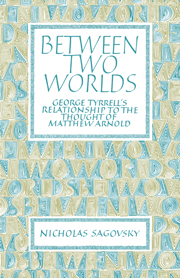Book contents
- Frontmatter
- Contents
- Acknowledgments
- Abbreviations and note on references
- 1 Tyrrell and Arnold ‘between two worlds’
- 2 The history of an opinion
- 3 ‘Definite evidence’
- 4 Fundamental convergence: epistemology and metaphysics
- 5 The life of the spirit: ecclesiology and culture
- 6 Christology: the parting of the ways
- 7 God, and ‘the Power that makes for Righteousness’
- 8 Conclusions
- Appendix Two letters to the Abbé Venard
- Notes
- Select bibliography
- Index
4 - Fundamental convergence: epistemology and metaphysics
Published online by Cambridge University Press: 23 October 2009
- Frontmatter
- Contents
- Acknowledgments
- Abbreviations and note on references
- 1 Tyrrell and Arnold ‘between two worlds’
- 2 The history of an opinion
- 3 ‘Definite evidence’
- 4 Fundamental convergence: epistemology and metaphysics
- 5 The life of the spirit: ecclesiology and culture
- 6 Christology: the parting of the ways
- 7 God, and ‘the Power that makes for Righteousness’
- 8 Conclusions
- Appendix Two letters to the Abbé Venard
- Notes
- Select bibliography
- Index
Summary
The first essay in Through Scylla and Charbydis is a lengthy apologia for catholicism, which concludes in the following rather ambiguous way. Tyrrell writes:
The Fathers have long since discovered an image of the Church in Eve, drawn from the side of Adam to be a helpmeet for him, albeit a costing one in many ways. In some respects the Hindu legend of the same event is even more illustrative. It tells us that when the Creator had taxed a million contradictory elements of the universe for contributions which he blended into a new creature and presented to man, the man came to him in eight days and said: ‘My Lord, the creature you gave me poisons my existence. She chatters without rest, she takes all my time, she laments for nothing at all, and is always ill.’
And Twashtri received the woman again.
But eight days later the man came again to the god and said:–
‘My lord, my life is very solitary since I returned this creature.’
And Twashtri returned the woman to him.
Three days only passed, and Twashtri saw the man coming to him again.
‘My lord’, said he, ‘I do not understand exactly how, but I am sure the woman causes me more annoyance than pleasure. I beg of you to relieve me of her.’
But Twashtri cried: ‘Go your way and do your best.’
And the man cried: ‘I cannot live with her!’
‘Neither can you live without her’, replied Twashtri. […]
- Type
- Chapter
- Information
- Between Two WorldsGeorge Tyrrell's Relationship to the Thought of Matthew Arnold, pp. 38 - 60Publisher: Cambridge University PressPrint publication year: 1983

